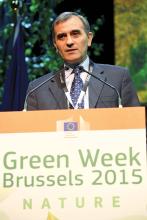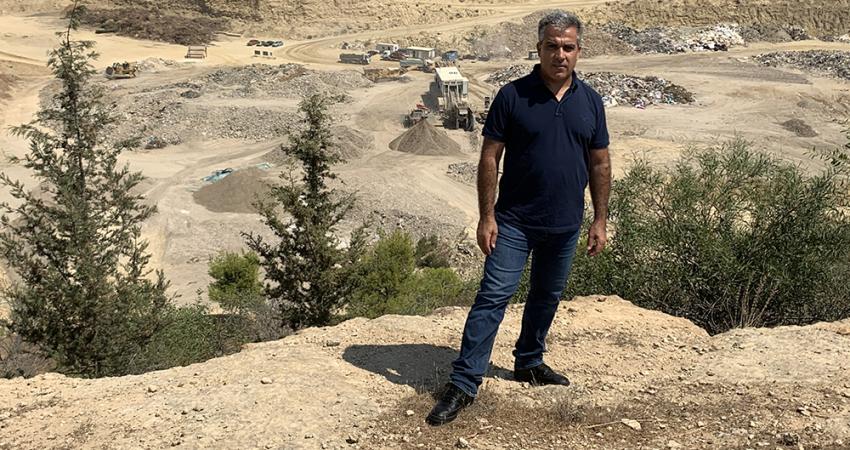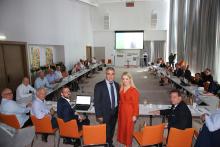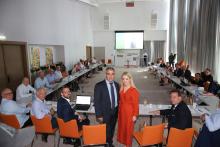At their 2018 Delegates Assembly in Barcelona, Spain, members of the European Aggregates Association (UEPG) elected Thilo Juchem as the association’s new president with a three-year mandate. He spoke to Aggregates Business Europe editor Guy Woodford about his priorities as the leader of an organisation championing the European aggregates industry in Brussels.
As the manager and liable partner of the Niederwörresbach, Germany headquartered
Such practical industry knowledge made the 53-year-old a wise choice to become the new president of the association, succeeding Jesús Ortiz, general manager for
“The figures of our sector are really impressive – 15,000 mostly small and medium-sized companies operating at 26,000 sites and producing 2.7 billion tonnes of aggregates every year to meet demand in Europe,” says Juchem.
The new UEPG president describes it as an “honour” to lead an industry association, with its permanent team in Brussels and experts across Europe, that not only lobbies European institutions and other stakeholders on key aggregates-related issues, but also represents “by far the largest non-energy extractive industry in Europe”.
Supported by UEPG’s 1st vice-president Antonis Antoniou Latouros, director of an SME (small and medium enterprise) in Cyprus and president of the Cyprus Aggregates Producers’ Association, and 2nd vice-president Nigel Jackson, CEO of the UK
“Our raison d’être is always sustainable access to primary and secondary [aggregates] resources. Supply should not be assumed which is probably the biggest mistake done by EU, national, regional and local decision- makers. The current rumours and social media messages on the scarcity of sand are factually wrong when it comes to the European market; but it helps to raise the potential consequences if we do not take care of continued and long-term supply. What we are facing is not a shortage of raw materials but a shortage of permits and long- term thinking.
“Another priority for my presidency is the compatibility of aggregates extraction and nature management. There are many excellent projects and concepts on this such as Life in Quarries, Nature after Minerals, and Temporary Nature. We will have more interactive receptions and other ways of getting involved with NGOs (non-governmental organisations), environmental experts and regional/local authorities. We have much to offer for the environment and stakeholders have now started recognising our industry’s work in this area.
“My third big priority is ensuring a stable and strong UEPG membership which guarantees a solid industry representation across Europe. That requires a sound
financial base and the use of social media for our industry to communicate more widely and more efficiently about what we do.”
Asked to highlight the biggest challenges facing UEPG members, Juchem, who served as UEPG 1st vice-president for three years prior to his recent election as president, replies: “Speaking from an SME’s perspective, businesses are facing ever more difficulties to manage all their bureaucratic requirements. Permitting procedures are too complex and lengthy. The already-mentioned restricted access to resources could become even more difficult.
“What we need from all EU institutions is a change of mind-set. We are not an industry that will threaten to relocate to China or India. We will not disappear; we are here to stay. We are a truly European industry – producing in Europe, for Europe. Stone material is everywhere and has been, for thousands of years, the material to build our infrastructure. It will remain a major and essential raw building material, whatever the politics.
“We need recognition of what we do differently and how we could be better and more efficient in land-use planning and permitting, extraction and production, health and safety and environmental performance. There is no quick fix to that but UEPG has been very actively involved in the Industry4Europe coalition of almost 130 industry associations calling for an ambitious industrial strategy for Europe; more precisely to ensure access to primary and secondary resources and an industry-friendly environment under the next European Commission.”
Juchem says he is keen to strengthen cooperation with other sectors of the non-energy extractive industries, via the NEEIP (Non-Energy Extractive Industries Panel), and identify potential synergies.
He also stresses that the UEPG will be advising its members, made up of businesses and associations across 26 countries, on how best to meet the European Commission’s recently approved Carcinogens & Mutagens at Work Directive. The directive is being implemented into national law within the next two years along with the revised Waste Framework Directive, which forms part of the Commission’s Circular Economy Package.
“The EU Nature Action Plan will have to show good results for nature and economic developments if the European Commission is serious about fixing the deficiencies
and integrating the concept of temporary nature,” continues Juchem. “During my presidency, UEPG will have to prepare for the EU elections in 2019 and working with a new European Commission and European Parliament.”
Turning his attention to European aggregates demand and opportunities for growth, he says: “My Irish colleague Jim O’Brien [UEPG honorary president and former president of UEPG] kindly collates economic data from UEPG members. That gives us a great advantage in understanding where we, as an industry, stand.
“According to these figures and trends, we currently see moderate growth after a long, and in some countries, drastic decline. We are currently at 2.7 billion tonnes but could reach three billion tonnes in 2020. The European average aggregates consumption per capita is around five tonnes and varies locally. But it gives a good indication where further potential might be.
“Saving by not maintaining heavily-used infrastructure could result in higher costs as repairing damage is generally getting more expensive. It originates from drastic budgetary cuts of public authorities and a short-term savings policy. In some countries we will see new infrastructure projects, but those with a dense network in place will probably have mainly maintenance works. It’s not all about money but also about having well-trained staff in allocating and managing funds available for the many construction projects in pipelines.”
Although the UK is due to leave the EU in March 2019, Juchem does not believe it will lead to any notable change in how the European aggregates industry operates.
“If and when Brexit happens, our UK member, the Mineral Products Association, has not issued any sign that it will leave our European Association. Indeed, it has signalled its intent to remain active in its work with European trade associations for the foreseeable future, valuing the cooperation and sharing of best practices membership brings. UEPG’s next Annual Delegates Assembly will be hosted by the MPA and takes place in London in May 2019, right after the UK is scheduled to leave the European Union. We value the MPA’s membership, and already represent non-EU members who are part of the European Free Trade Association (EFTA), and those outside of inter-governmental institutions, such as Israel. Brexit will have little direct impact on mainland European business as we are a regional and local industry with average transport ranges of 30-50 kilometres and little intra-EU import and export.”
Europe has a healthy recycled aggregates market compared to many other parts of the world. For example, Mineral Products Association (MPA) figures show how the use of recycled and secondary materials in the British aggregates market stood at 63 million tonnes in the year 2015, a considerable rise on the 30 million tonnes used in 1990.
Juchem welcomes the fact that in a wider European context UEPG member companies are increasingly recycling as well as extracting aggregates.
“Recycling requires the input of high- quality raw construction materials and products to ensure that these materials can be recycled at the end of their working life. Our industry has already obtained high levels of quality with asphalt, for example, being recyclable over several cycles. However, the main challenge is the timely and local availability of recyclable materials. This works better in urban areas with construction and demolition activities taking place more often and with less transport distances than in rural areas. UEPG represents all types of aggregates from primary and secondary resources.”
The use of plant automation technology and predictive maintenance solutions is a growing trend in the European quarrying sector, as quarry operators and contractors look to maximise operating efficiencies and boost their bottom lines.
Commenting on the importance of such technology to the long-term future of aggregates production, Juchem says: “It is not innovative technology or automation
which reduces job opportunities. It is the lack of a skilled workforce that is pushing us to boost the adoption of this technology in our extraction sites. To maintain and develop skills in our industry is as important as the use of new technology.”
As well as his work within the UEPG, Juchem, who is married and has two children, is a board member of the German Aggregates Federation (MIRO). He is also president of the Regional Aggregates Association of Rhineland Palatinate and Saarland (VERO).
Juchem’s passion for the European aggregates industry comes through in his responses to my questions. He emphasises how it “feels good to work for an industry that makes an important contribution to society,” adding, “after air and water, we supply the most used raw material in the world. Our products are omnipresent in everyday life.
“The extraction of aggregates can be done in a very environmentally-friendly way. Most emissions are generated during transport from the extraction to the construction site. When asked what the main products of our industry is, I like to respond – ‘nature reserve areas’. Our sites are often surrounded or covered by Natura 2000 areas. Valuable biotopes, newly-created habitats and rare plant and animal species are not in quarries, sand and gravel extraction sites despite our activities, but thanks to extraction of aggregates creating the best conditions for pioneer species.
“We contribute to biodiversity already during the extraction of aggregates, not only afterwards when the site is being restored. We in the industry know that, but it is much
less known by the public.”








